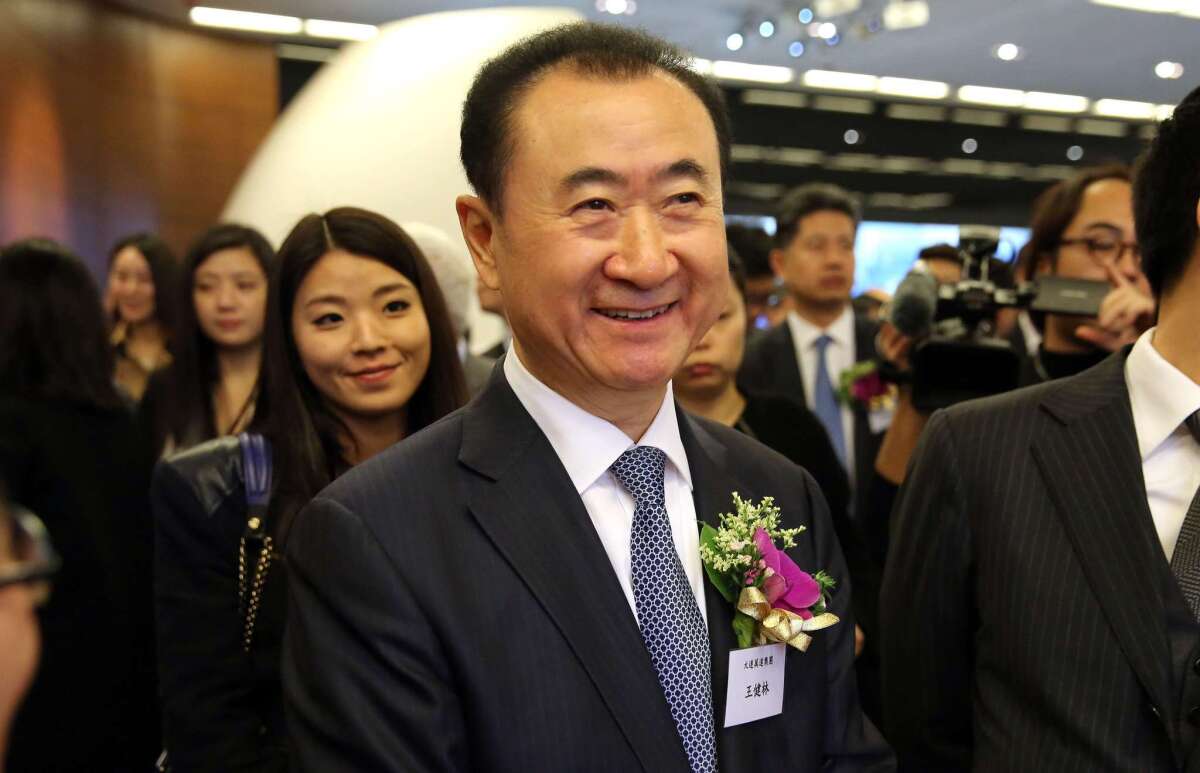China’s Wanda in talks to buy Legendary Entertainment

Wang Jianlin, chief executive of Dalian Wanda Commercial Properties, arrives before the company’s IPO at the Hong Kong Stock Exchange on Dec. 23, 2014. Wanda is the owner of China’s largest theater chain.
- Share via
Reporting from Beijing — In a potential watershed moment for Hollywood, the company behind “The Dark Knight,” “Jurassic World” and “The Hangover” is about to become Chinese-owned.
Dalian Wanda Group, the giant Chinese media and real estate company, is closing in on a deal to acquire a majority stake in Burbank-based Legendary Entertainment in a deal that values that company for as much as $4 billion, said people familiar with the matter who were not authorized to comment publicly on the negotiations.
The deal would represent the first acquisition of a major U.S. production company by a Chinese investor and is expected to be finalized and announced by early next week. Until now, Chinese media companies have pursued narrower deals in Hollywood, such as investing in movies or providing financing for co-productions.
Wanda’s more ambitious play could signal a new phase in the growing ties between the entertainment industries of the two countries.
Wanda, China’s largest cinema company, has already made headlines with its U.S. investments. In 2012 it acquired AMC Entertainment, owner of the nation’s second-largest movie theater chain, for $2.6 billion.
“The U.S. investments in AMC, and now possibly Legendary, would give them a seat at the table in Hollywood, and therefore clout in the rest of the world where Legendary-branded films would play,” said Rance Pow, president of Artisan Gateway, a film industry consulting firm.
Legendary already has a significant presence in China, where it has an agreement to co-produce movies with the powerful state-owned China Film Co. Among them is the big-budget science fiction movie “The Great Wall,” the upcoming Universal Pictures release starring Matt Damon.
Wanda would give Legendary a stronger foothold in a country expected to surpass the size of the North American box office by 2017. The expanding box-office revenue in China — ticket sales surged nearly 50% last year — makes China an increasingly valuable market to U.S. film companies and has prompted a flurry of deals on both sides of the Pacific.
At the same time, acquiring Legendary could significantly boost the ambitions of Wanda, which is building what it bills as “the world’s largest film and television studio” in the eastern Chinese city of Qingdao, where parts of “The Great Wall” were filmed. Spread across more than 400 acres, Wanda Studios Qingdao will house 30 soundstages, a permanent facsimile of a New York City street, a temperature-controlled underwater stage, the country’s largest exterior water tank and postproduction facilities. The first phase of the studio is scheduled to open in 2017, and the company is seeking to lure both Chinese and international productions to the facility.
Last spring, Wanda touted the studio at Cannes and the AFCI locations show in Los Angeles, where it was the only Chinese company to attend. Nancy Romano, chief operating officer of Wanda Studios Qingdao, said at the time that productions would be eligible for “extremely generous” incentives. For the studio’s launch ceremony in 2013, Wanda flew in numerous Hollywood celebrities, including Leonardo DiCaprio and John Travolta, to give the event some high-wattage star power.
“Nothing comes as a surprise in the age of global mergers and acquisitions, with Chinese firms playing an increasingly prominent role in the 2010s, replacing the Japanese in the late 1980s and the Koreans in the late 1990s,” saidYing Zhu, a professor at City University of New York who focuses on the Chinese entertainment industry.
The sale would put Legendary, founded in 2005 by Thomas Tull, under the control of Wang Jianlin, one of China’s richest men. Two years ago, Wang openly expressed interest in buying Lionsgate, the independent studio behind the “Hunger Games” franchise, but a deal never materialized.
Wanda did assert its influence in other ways. The company in 2013 donated $20 million to the Academy of Motion Picture Arts and Sciences for its film museum on the Los Angeles County Museum of Art campus. A year later, Wanda bought the site of the former Robinsons-May department store in Beverly Hills and announced plans for a $1.2-billion mixed-use development there.
Representatives of Wanda and Legendary declined to comment.
Reuters, which first reported on the pending deal, said the transaction values Legendary at $3 billion to $4 billion.
Japanese telecommunications firm SoftBank Group Corp. and investment firm Waddell & Reed Inc. have also agreed to sell their stakes in the company.
Wang has repeatedly emphasized his desire to go global and signaled that he intends to do that through mergers and acquisitions.
“We seek to become a world-class multinational company and a famous brand,” Wang said at the company’s semiannual meeting in July, telling investors that doing so “is also a core element of our transformation” from being simply a real estate company.
He forecast that by 2020, 30% of the company’s revenue would be from overseas, and said that overseas merger and acquisition activities would increase in 2016. Wanda is looking in particular at “cultural industries,” sports and finance.
Last year, Wanda acquired the Swiss sports marketing company Infront Sports & Media for more than 1 billion euros, purchased the organizer of the Ironman Triathalon races for $650 million, bought a 20% stake in Spain’s Atletico de Madrid soccer club, and took over Australia’s second-largest cinema chain, Hoyts, for about $365 million.
“Top 500 companies are constantly changing but they have one thing in common — none of them reached such a scale entirely through their own development,” Wang said at the investors’ meeting. “All of them have engaged in mergers and acquisitions. To rapidly become a world-class [multinational company], Wanda can only take one path in its overseas development and that is to mainly depend” on mergers and acquisitions.
Wang has spoken repeatedly of his desire to create a vertically integrated entertainment company spanning production, distribution and exhibition. Wanda Pictures and its recently launched Wuzhou Film Distribution subsidiary distributed 14 films in 2015, including “Mojin: The Lost Legend,” which has raked in nearly $239 million in mainland China since opening in mid-December.
In an 2012 interview with The Times, Wang said he planned to invest $10 billion in the U.S. over the next decade, which might include real estate, hotels, department stores and another movie chain. He also said he was seeking partnerships with Hollywood studios.
“We would like to invest in film production, and we’d like to partner with directors, actors and filmmakers from Hollywood,” he said. “They need to know the Chinese market is growing very fast, and they should come as early as possible.”
Verrier reported from Los Angeles and Makinen from Beijing.
More to Read
From the Oscars to the Emmys.
Get the Envelope newsletter for exclusive awards season coverage, behind-the-scenes stories from the Envelope podcast and columnist Glenn Whipp’s must-read analysis.
You may occasionally receive promotional content from the Los Angeles Times.








